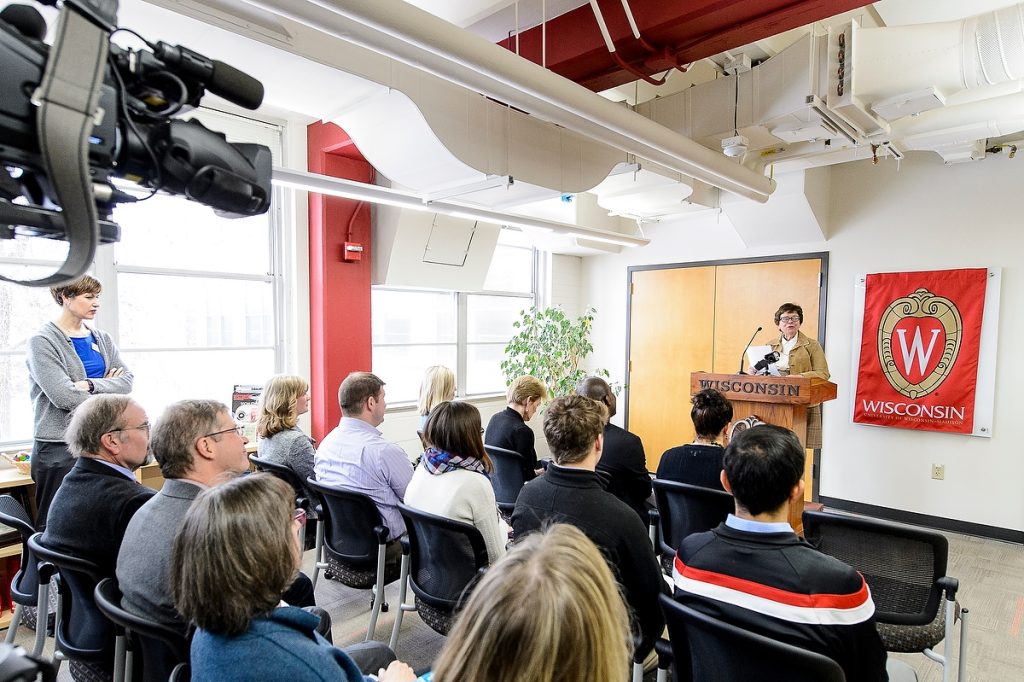If you haven’t been in Ingraham Hall lately, I encourage you to stop by and visit the expanded Career Exploration Center in its new space across from the Badger Market on the first floor.
This renovated space is where thousands of undergraduates from across the campus will find resources and expert guidance to finally answer that question they’ve been hearing since kindergarten: What do you want to be when you grow up?
Our incoming freshmen come to us with top grades, top ACT scores, and a mind-boggling list of extra-curricular activities. Some of them know just what they want to do and how to get there. But many arrive with multiple ideas about possible careers, and a wide array of subjects they’re interested in studying.
One of our most important jobs is to help them evaluate those ideas – to find the intersection that brings together what they love to do and what they’re good at doing. And then help them translate that into career possibilities, and map out a way for them to get there.
The Career Exploration Center supports undergraduate students from across the campus by connecting them with services and resources that help them make decisions about their majors and career paths. Students can access programming and career assessment tools through the center and schedule career counseling sessions with a professional career advisor.

Offering good services that help connect students to a career is a priority for us at UW-Madison, as well as a priority for the Board of Regents and state leaders. This is why we continue to upgrade our career planning services to get students thinking about careers sooner than they have in the past.
Two years ago the College of Letters & Science began offering a new course for sophomores called Career Development: Taking Initiative designed to give students tools to apply what they learn to future career and life decisions. Nearly 1,000 students have enrolled since the course launch, with outstanding participation among first-generation and targeted minority students.
University Housing’s residential learning community, Career Kickstart, is in its second year. Built around career immersion, it filled immediately and is again at capacity this year. We have expanded internship programs, and we are bringing in more businesses to connect with students at enhanced campus career fairs. Letters & Science has doubled the number of job and internship postings and campus interviews, and employers snapped up every spot at its latest career fairs.
We are also developing more ways to connect our alumni with our undergraduates, letting them provide advice and mentoring to students interested in their career paths.
Our career programs are getting noticed nationally. The L&S Career Initiative has become a national model – we’ve had inquiries from the universities of Michigan, Illinois, Minnesota, Ohio State, New Hampshire, Rutgers, and even the University of Iceland. And just this month, Money Magazine named UW-Madison’s career services among the top five in public schools in the nation.
We know that students who sift through options and develop a sense of their career interests early stand a better chance of graduating on time, which in turn limits their student loan debt. These students are also more likely to pursue internships and field experiences that let them sample a career and be sure it’s the right fit for them.
Many of our alums have followed careers that brought them into very different areas than their specific major or their first job. Given how rapidly the world of work is changing, many of our students will work future jobs that are not even available today. That’s why we don’t train students for specific jobs in the way that many technical colleges do. We want to prepare UW-Madison graduates for lifelong careers, not for a single job.
But that doesn’t mean early career planning isn’t helpful. By their sophomore year, students should be thinking about their specific skills and interests and planning how to put together a series of courses and outside classroom experiences that will best position them to job-hunt upon graduation. The Career Exploration Center makes that a little easier.